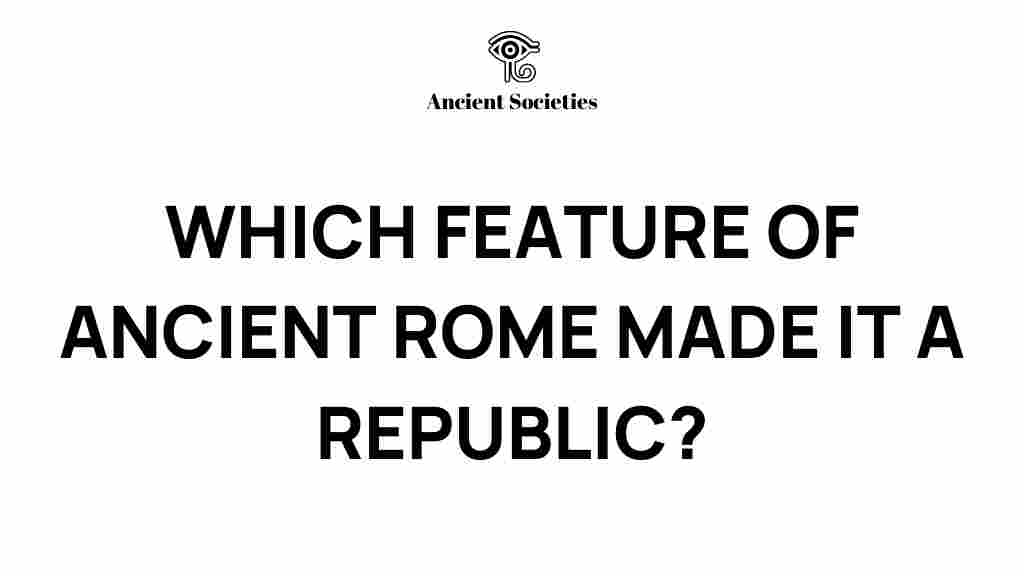Unveiling the Secrets of Rome’s Republican Revolution: Understanding Ancient Rome’s Governance
Ancient Rome, a civilization that flourished for over a millennium, is renowned for its profound influence on modern governance, law, and political systems. The transition from monarchy to republic marked a pivotal moment in Roman history, laying the groundwork for a unique form of governance that emphasized democratic principles, civic duty, and citizenship. This article delves into the intricacies of Rome’s Republican Revolution, exploring its political dynamics, the role of citizenship, and the evolution of democracy in Ancient Rome.
The Genesis of the Roman Republic
The Roman Republic was established in 509 BC following the overthrow of the last king, Tarquin the Proud. This monumental shift was driven by the desire to abolish monarchical tyranny and introduce a system of governance that represented the interests of the citizenry. The Republic’s creation was not merely a political change; it was a social and cultural revolution that reshaped power dynamics in Ancient Rome.
- Key Events Leading to the Republic:
- The expulsion of Tarquin the Proud
- The establishment of the Senate
- The creation of the consular system
The Structure of Roman Governance
The Republican governance system was characterized by a complex framework designed to prevent any single individual from accumulating too much power. This was achieved through a combination of elected officials, checks and balances, and a system of representation.
- Key Institutions:
- The Senate: Comprised primarily of aristocrats, the Senate was a powerful advisory body that influenced legislation and foreign policy.
- Consuls: Two consuls were elected annually to serve as the highest executive officials, sharing power and responsibilities.
- Assemblies: Citizens participated in various assemblies, where they could vote on laws and elect officials.
Democracy and Citizenship in Ancient Rome
While Ancient Rome’s governance was not a democracy in the modern sense, it incorporated democratic elements that allowed citizens to play a role in political decision-making. Citizenship was a cornerstone of this political system, and it conferred various rights and responsibilities.
- Rights of Citizenship:
- Voting in assemblies
- Holding public office
- Legal protections and rights
However, it is essential to note that citizenship was not universally granted. Initially, it was limited to freeborn males of Roman descent, excluding women, slaves, and non-Romans from the political sphere.
Power Dynamics and Class Struggles
The Republican period of Ancient Rome was marked by significant power struggles between different social classes, most notably between the Patricians and the Plebeians. This conflict played a crucial role in shaping the political landscape of the Republic.
- Patricians vs. Plebeians:
- Patricians: The aristocratic class who held most of the political power initially.
- Plebeians: The common people who fought for more rights and representation.
The struggle for power led to significant reforms, including the establishment of the Tribune of the Plebs, an office that allowed Plebeians to have a voice in governance.
The Role of Civic Duty in the Republic
Civic duty was a vital aspect of Roman identity and governance. Citizens were expected to participate in political life actively, which included voting, serving in the military, and holding public office. This sense of duty fostered a collective responsibility among citizens, reinforcing the idea that governance was a shared endeavor.
- Aspects of Civic Duty:
- Participation in elections
- Engagement in public debates and discussions
- Defending the Republic in times of war
Challenges and Troubleshooting within the Republican System
Despite its innovative governance structure, the Roman Republic faced several challenges that threatened its stability and effectiveness:
- Corruption: As power became concentrated, corruption among elected officials became a significant issue.
- Social Unrest: Class struggles often led to riots and civil discord, disrupting governance.
- Military Influence: Commanders with loyal armies could sway political decisions, undermining the Republic’s democratic principles.
Addressing these issues required ongoing reforms and adaptations to the political system. The Romans recognized the need for vigilance in maintaining their governance structure to prevent the erosion of their hard-won freedoms.
The Decline of the Republic
The Republic eventually succumbed to internal strife and external pressures, leading to its decline. A series of civil wars and the rise of powerful generals, such as Julius Caesar, demonstrated the fragility of the republican ideals.
- Factors Contributing to the Decline:
- Power struggles among elites
- Increased reliance on military leaders
- Political corruption and inefficiency
By 27 BC, the Republic was effectively replaced by the Roman Empire, marking the end of the republican experiment in governance.
The Legacy of Rome’s Republican Revolution
Despite its eventual decline, the Roman Republic left an indelible mark on the history of governance. Its principles of citizenship, civic duty, and checks on power continue to resonate in modern democratic systems. The idea that citizens have a role in governance and that power should be distributed among various institutions remains central to contemporary political thought.
For those interested in exploring more about the influence of Ancient Rome on modern governance, consider visiting this detailed resource.
Conclusion
Ancient Rome’s Republican Revolution was a landmark event that not only transformed Roman society but also laid the foundation for future democratic systems. The delicate balance of power, the emphasis on civic duty, and the complex dynamics of citizenship shaped the governance of one of history’s greatest civilizations. As we reflect on the past, it becomes clear that the lessons learned from the Republic’s successes and failures continue to inform our understanding of democracy and governance today. By studying Ancient Rome, we can appreciate the intricacies of political systems and the enduring importance of active citizenship in shaping our world.
For further exploration of the political systems that emerged from Ancient Rome, check out this insightful article.
This article is in the category History and created by AncientSocieties Team
